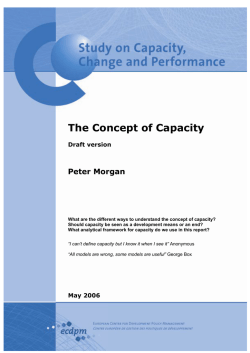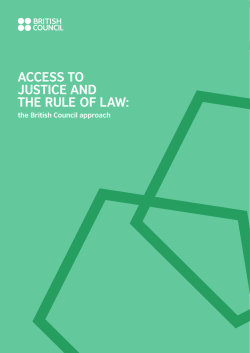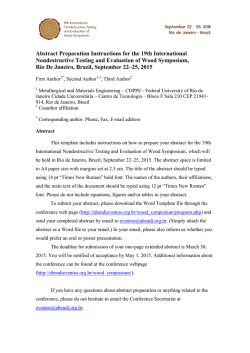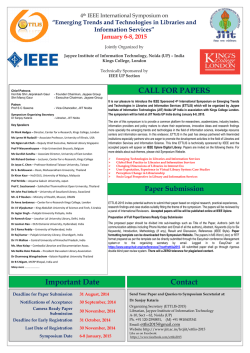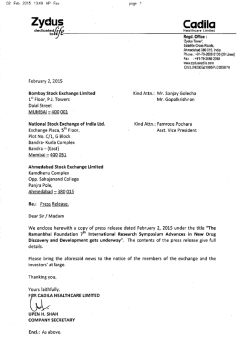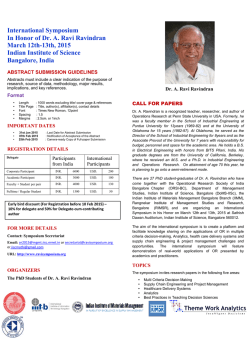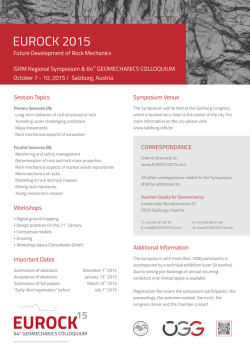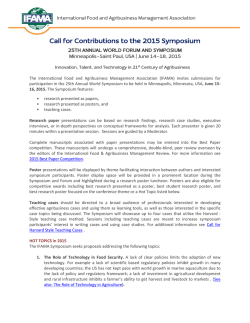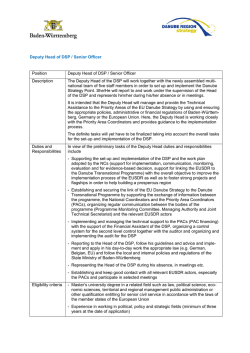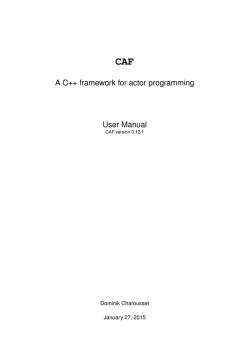
Symposium Economic Crisis and European actors
CALL FOR PROPOSALS The Economic crisis and the reconfiguration of European actors International symposium of the ProjEx Strasbourg School of European Studies funded by the Excellence initiative of the University of Strasbourg November 4-6, 2015 Collège doctoral Européen, University of Strasbourg Organization committee: Amélie Barbier-Gauchard, William Gasparini, Elisabeth LambertAbdelgawad, Jay Rowell, Sylvain Schirmann Please send a 1 page abstract of your proposal and a synthetic CV to Jay Rowell ([email protected]) indicating one of the five themes by January 30, 2015. The dialectical relationship between the successive crises and the relaunch of the European project has largely structured shared understandings of the history of European institutions (CEE, EU and Council of Europe). The ongoing economic and financial crisis which has rocked Europe since 2008 appears to many observers to have broken this pattern. Rather than leading to a renewal of the European project, the current situation appears to be characterized by an sedimentation of problems of different natures: the stagnation of the economy and the unprecedented recession in several countries; spiraling debt and uncertainties on the future of the Euro; the rise in tensions between member States; the crisis of the “European social model” and the rise of Euroscepticism in public opinion. However, despite the inflation of alarmist discourse, the financial and economic situation has not led to an institutional crisis. European institutions continue to produce norms and public policy, the European Parliament was reelected in an atmosphere of general indifference, a new College of commissioners was designated, and in many respects European institutions have been able to resist and adapt to changing circumstances. This adaptation has however produced effects on the role and the centrality of certain types of actors and institutions, especially the European Central Bank and certain Commission DGs in charge of monitoring budgetary discipline and macroeconomic stability. The objective of the symposium will not consist in engaging in an often normative or teleological debate on the nature of the European crisis or its manifestations. On the contrary, it will first seek to open interdisciplinary avenues to understand the construction of the crisis discourse and the political work of a variety of actors who translate the economic situation into political imperatives on the types of required reforms and institutional adjustments. Second, we will seek to establish the very real effects of the construction of the economic crisis as a European problem on the distribution of resources and power between actors and institutions and its effects on public policy. The goal will be 1 to work beyond interpretations which are narrowly focused on institutional arrangements and binary opposition between endogenous and exogenous problems. The state of the economy and financial turbulences do not exert mechanical effects- to do so they must be problematized by coalitions of actors who translate economic trends into political and institutional plans of action. The sequence which began with the collapse of Lehman Brothers was marked by a rapid succession of controversies on the source of the problem, its scale, the proper forms of regulation and the pertinent level of government to respond. These successive redefinitions transformed the American subprime crisis into a crisis of European banks, then a public debt crisis, the Euro crisis, a crisis of the European economic model and the European project itself. At different times, proposed solutions varied from nationalizing struggling banks, issuing Eurobonds, imposing austerity, reregulating the banking sector through policies on the global, European or national scale of intervention. Who intervened in these successive redefinitions linking economic problems with policy imperatives, with which types of knowledge and with which types of solutions? The situation of uncertainty therefore created new opportunities and resources which redistributed power in ways which the symposium will seek to address. By contextualizing the crisis in its historical, sociological, economic and institutional context the symposium will aim to question more structural tensions and paradoxes of the European project: In which contexts and under which conditions can a crisis accelerate European integration? Why did the 2008 banking crisis which initially seemed to invalidate policies of market deregulation and rehabilitate the role of the State finally appear to reinforce the position of actors and institutions seeking to reduce the role of public intervention in economic regulation? Does the sequence starting in 2008 mark a rupture in the trajectory of the European project or actually lead to the consolidation of dominant actors and existing policies? What are the effects of the way in which the crisis was problematized on the setting of institutional agendas and on the division of labour between European institutions and member States? How were the themes of exogenous and endogenous tensions and crises articulated? How does uncertainty translate into controversies and how do controversies end through the imposition of a dominant interpretation and course of action? The symposium will be organized around five themes which will be developed over two and a half days. 1) Historicizing the relationship between economic turbulences and European institutions Economic prosperity has played a central role in the legitimation of the European project. Presented in the 1950’s as a means make European economies interdependent to avoid future wars, economic prosperity and growth has become an end in and of itself. We propose in this theme to examine the relationship between economic cycles, legitimation discourses and the configuration of European actors in a historical perspective. Proposals could focus on two areas in particular. First, comparisons of the current situation with other critical junctures (the great depression, the rebuilding of Europe after 1945, the end of the Bretton Woods system, the oil crises and stagflation of the 1970’s, monetary speculation of the early 1990’s, the bursting of the internet bubble, etc.), could seek to establish the singularity or common patterns in the way in which economic or financial problems are put in relation with the European project or institutions. Second, participants could study how European actors have since 2008 used history to give meaning to the crisis and mobilise historical precedents to justify reform proposals. 2 2) Framing of the crisis and its effects The outbreak of the subprime crisis was followed by an intense debate on the nature of the problem and its resolution. The economic and budgetary crisis was also a crisis of the intelligibility of the relations between public authorities (not only European, but also national and supranational), financial markets and the “real” economy. These debates turned an exogenous shock into an endogenous matter for the European field. A succession of consensual policy orientations were challenged in an astonishingly quick succession: the loosening of budgetary restrictions for purposes of economic recovery between 2008 and 2010 gave way to the return of austerity and regain the trust of financial markets; forceful declarations on regulating speculative markets and tax havens in 2008 and 2009 ultimately yielded minimal results. Contributors to this session could focus on analysing this process whereby the causes and consequences of the crisis are shaped and interpreted by actors who permanently or intermittently participate in the European field (political and administrative actors at various levels, media, experts and academics…). Contributions could also compare how these discourses are refracted in national public spaces and investigate the sociological and institutional conditions of the opening and closing of controversies. 3) The economic crisis as a resource and as a vector of a redefinition of competences Analyses of effects of the economic crisis have been opposed those who argue that Member States have reaffirmed their leadership to the detriment of the European Commission and those who point out the enhanced role of the ECB, some Commission Directorates-General and recently created European agencies. Although these shifts have not been codified in a treaty, the crisis appears to have resulted in important transfers of competences by shifting balances between Member States, interest groups and the areas of action of the European institutions. Participants working on this theme may assess whether the crisis has strengthened the position of actors with economic skills (within the institutions, in the field of European studies, and in the spaces of European expertise or commentary) by pushing aside actors with more legal and diplomatic resources. They could also look into the circulation of individuals, ideas and instruments of action between academic, expert and institutional spaces. Contributors might also study the mechanisms converting the crisis into institutional or political resources, changes in the power relations between actors and the mecanisms the legitimation or de-legitimation of actors and institutions. We will also welcome research on the effects of voluntary contributions by states and secondments of personnel to the European institutions on the redefinition of European and national policies, as well as on the effects of the priority policies implemented by the European Court of Human Rights. Others could focus on the emergence of new forms of tension or competition between levels of government in the face of the temptation to renationalize some competences and to introduce regulation tools into global scales to the detriment of the European level. 4) Economic policy models and instruments The fourth theme will address the overarching questions from a different angle. In order to complement our analysis of the construction of the economic crisis as a European problem and its effects on configurations of actors and institutions, we propose a specific focus on the 3 embedding of instruments of knowledge and action within economic and financial regulation policies. The choice and use of certain indicators to determine the urgency and saliency of problems contributes to the construction and resolution of these problems. Contributors working on this theme may study the multiple actors who provide public policy with instruments (economists, think tanks, rating agencies, specialised journalists, politicians, toplevel civil servants, etc.) or analyse “technical” controversies and the effects of such choices (threshold effects, conditionality, setting of objectives and reforms…). These instruments ultimately result in transfers of power and legitimacy by reinforcing institutions with no democratic basis (ECB, DG ECFIN, IMF, Troika) and promoting some public problems (debt, public expenditure, competitiveness) instead of others (lack of growth, rising inequalities, unemployment). 5) Austerity and the transformations of public policy in Europe Under the pressure of credit rating agencies and financial markets, the economic crisis has been interpreted as a crisis of the Euro and of sovereign debt rather than a crisis of growth, employment or rising social inequality. European institutions have pushed for national structural reform policies and increasingly strict control of budgetary discipline. Austerity measures and structural reforms have had a twofold effect. First, a range of public policies such as environmental protection or the fight against poverty have been placed lower on institutional agendas. Second, financial markets and the European institutions have put pressure on states to conduct structural reforms intended to downsize government, deregulate the job market and reduce public expenditure, particularly in social policy. In this last session, we will strive to analyse the effects of the economic crisis on other public policies (social, cultural, environmental…) at various levels of governmentand rely on empirical studies to evidence the direct and indirect effects of the neo-liberal bias of European construction. 4
© Copyright 2026
